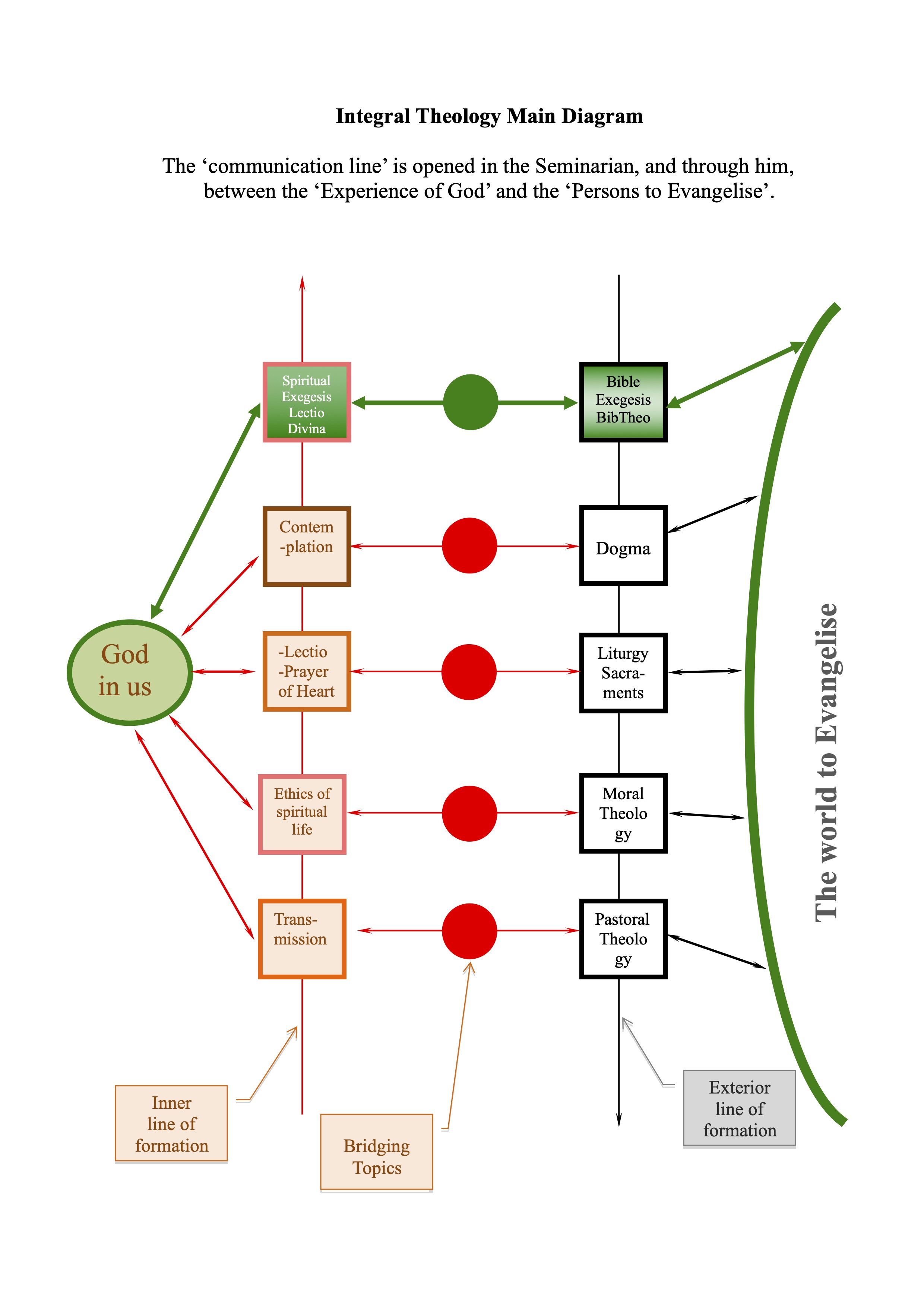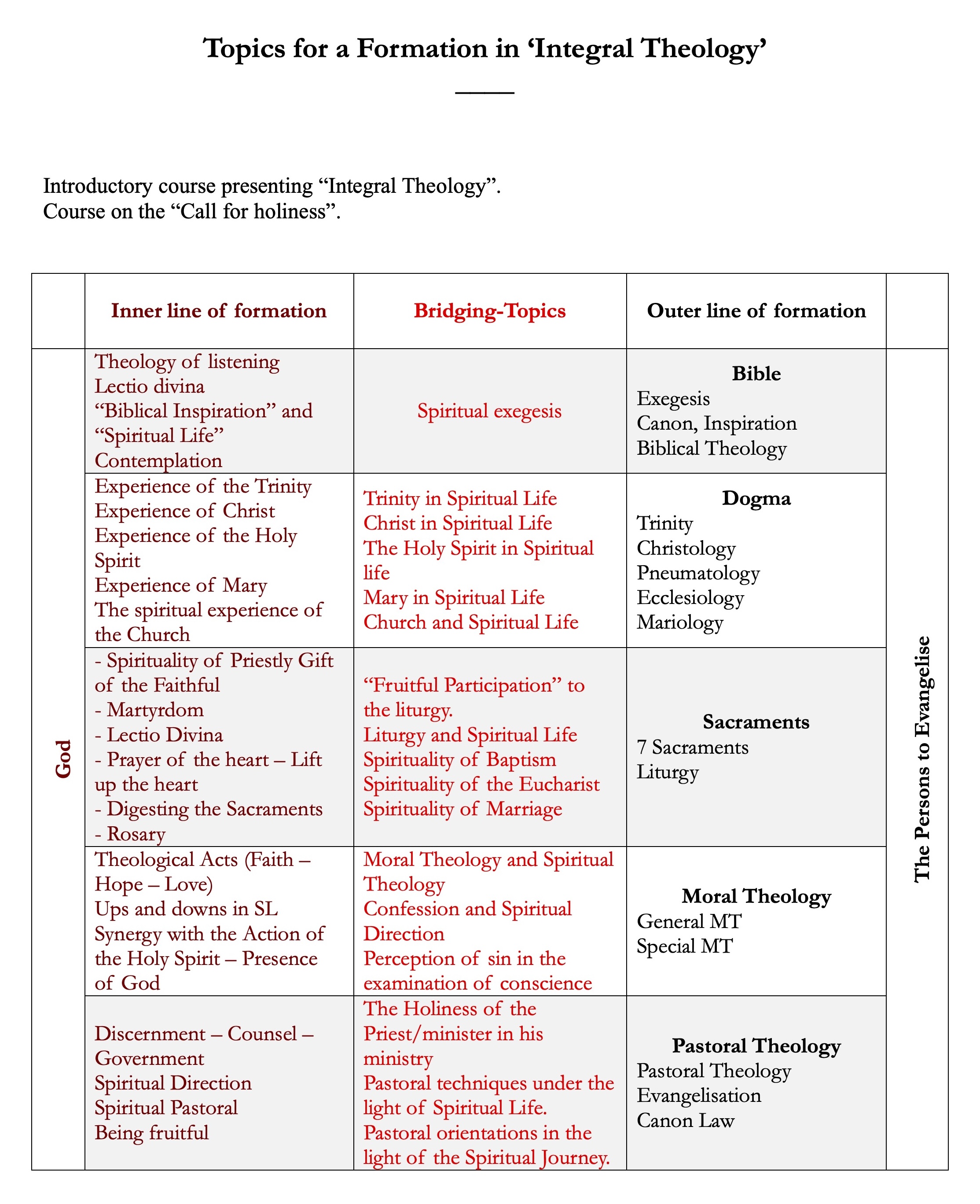The Church’s wish for the students of Theology is that they relate in-depth to what they are studying. As Vatican II says: “The theological disciplines […] should be so taught that the students will correctly draw out Catholic doctrine from divine revelation, profoundly penetrate it, make it the food of their own spiritual lives, and be enabled to proclaim, explain, and protect it in their priestly ministry.” (Vat II, OT 16) This too was the deep desire of Pope Benedict in his magisterium. He also reminded us of the existence in the past of a “Monastic Theology” (see here). Pope John Paul II used the expression “Sapiential Theology” (see here). It is vitally important for each student in Theology to see the connection between these more spiritual ways of theologising and the actual way now used. “Prophetic Theology” or “Integral Theology” is the bridge between the two theologies and encompasses both of them.
Proposal for Integral Theology formation
Jean Khoury and I propose a new vision to understand and teach Theology, in which Catholic teaching would be presented, in its entirety and with academic rigour, in a way that fully integrates the actual way of understanding and teaching theology with deeper spiritual theology and the spiritual life of the seminarian. A theology that guides us to union with God and the fullness of love and not just gives an understanding of faith.
“The theological disciplines […] should be so taught that the students will correctly draw out Catholic doctrine from divine revelation, profoundly penetrate it, make it the food of their own spiritual lives, and be enabled to proclaim, explain, and protect it in their priestly ministry.” (Vat II, Optatam Totius, 16)
Until the early Middle Ages spiritual life and academic theology were inseparable but have become distanced since then in a way that does harm to both. Today studying Theology can sometimes be dry and abstract. The seminarian doesn’t always see with practical clarity the relationship between his studies and his personal spiritual life. Beyond some talks given in the Seminary on Prayer or the Liturgy and some input on Spiritual Theology, during the seminary years Spiritual Formation is often left to personal effort, reading and spirituality.
Using the depths of Spiritual Theology, the method of integral theology intends to offer exciting theological bridges between our personal spiritual life and theological studies, namely Bible, Dogma, Sacraments, Commandments and Ministry.
It also tackles the vital necessity for a wholesome and more practical Spiritual Formation. Amongst other things this formation can utterly transform the way in which the seminarian will view and pray the Mass.
This way of making theology will enable God’s grace to flow more easily from within, identifying what one learns as concrete and alive. The combination of academic teaching and formation in spiritual life will make the learning and deep integration of theology much more fruitful to the seminarian. Then intellect and heart become unified, intellectual life, worship and personal spiritual life flow in one continuum. A strong witness and ministry develop, becoming alive, truthful, and capable of conveying to others, in a practical way, what has been learned, thereby feeding the spiritual life of his brothers.
See the accompanying below the schematic presentation and examples on how, in each area of theology, integrating actual theology (right column) and spiritual theology (left column) can be achieved.
Mgr. Keith Barltrop is parish priest of St. Mary of the Angels, Bayswater, and is a past rector of Allen Hall seminary and director of the Bishops’ Conference Agency for Evangelisation. He can be contacted on: keithbarltrop@rcdow.org.uk
Jean Khoury has a Masters in Spiritual Theology from the Institut Catholique in Toulouse France and the Teresianum, Rome, and is researching a PhD at the Teresianum. He founded the School of Mary in 2003 and has written books and articles on prayer and spiritual life. http://www.schoolofmary.org He can be contacted on: jeancyrille@ gmail.com


Jean Khoury
Pdf version (click here)
Full Text of the Project: In French (see the book), In Italian. (see the book)
What to Do?
Practically, students in Theology can start complementing their studies in theology with the lacking topics and courses. The School of Mary does recommend two sets of Courses (for the individual courses see here):
1- Courses in Spiritual Theology: Solid Foundations Course is a minimum (SF000).
2- Courses that act as a bridge between the five main areas of Theology and Spiritual Theology :
a- “Bible and Spiritual Life” (SF102), “St. Luke and Spiritual Life” (SF104), “St. John in Spiritual Life” (SF302).
b- “Dogma and Spiritual Life” (SF204) First Video
c- Liturgy and Spiritual Life – Mass and Spiritual life (SF206): “Lectio Divina” and “Prayer of the Heart” (included in Solid Foundations SF000).
d- Moral Theology and Spiritual Life : “Sermon on the Mount” (SF103) – “The Commandments and Spiritual Life” (SF208)
e- Pastoral Theology : Ministry and Spiritual Life (SF308). Blessed Marie Eugene “I am a Daughter of the Church”, chapter : Growth in Love and Ministry.
Example of Integral Theology: Dogma and Spiritual Life
The following video recorded lesson give us an example on how to see the connection between “Dogma” and “Spiritual Life”. This is the third lesson from the Course “Solid Foundations” (2011).
– First Part.
Bibliography
School of Mary
– Theology and Spiritual Life (video)
– Lectio Divina & Theology (text and video)
– The Method in Theology. How can be the method for the future generations. Video.
– Moving From one Theology to the Other
– Video Course SF102: “Bible and Spiritual Life”
– Video Course SF204: “Dogma and Spiritual Life”
– Video Course SF206: “Liturgy and Spiritual Life”
– Video Course SF208: “The Commandments and Spiritual Life”
– Video Course SF308: “Ministry and Spiritual Life” (to come) Read: “Apostolate and Growth of Love”
Authors / Documents
– The Interpretation Of Sacred Scripture In The Church (Pope Benedict XVI, “Verbum Domini”, 2010, 29-49)
– Theology Today: Perspectives, Principles and Criteria (International Theological Commission 2012)
– Hans Urs von Balthasar, “Theologians and Saints”
– Pope Benedict XVI, “Monastic Theology and Scholastic Theology”, Papal Audience
– Inos Biffi, “La costruzione della teologia. La filosofia monastica: ‘sapere Gesù'”, JacaBook, 2008.
– “Sapiential Theology“, Pope John Paul II
– “Divini Amoris Scientia” by Pope John Paul II declaring St. Thérèse Doctor of the Church
– Jean Krynen, “La mystique déracinée. Drame (moderne) de la théologie et de la philosophie chrétiennes (XIIIe-XXe siècle)”, Presses de l’Université Toulouse Capitole, 2016.
– Dom Jean Leclercq OSB, “Love of Learning and the Desire for God: A Study of Monastic Culture”, Fordham University Press; 3Rev edition 1983.
– François-Marie Léthel OCD, “La luce di Cristo nel cuore della chiesa. Giovanni Paolo II e la teologia dei santi”, Libreria Editrice Vaticana, 2011.
– M. M. Philippon OP, “The Spiritual Doctrine of Sister Elisabeth of the Trinity”, 1955.
– Joseph Ratzinger, “The theology of History in St. Bonaventure”, Franciscan Herald, 1989.